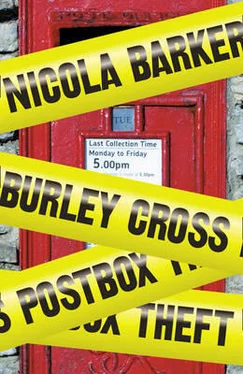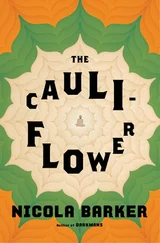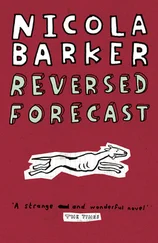We were standing up there only the other day, squinting over towards the power station (it was an especially beautiful, crisp, clear winter’s morning) and laughing together about our early experiences with Glenys after we first arrived at Threadbare. She was always a rather singular creature!
We remembered her throwing that brick through our kitchen window — and we’d barely been ensconced a week — because we trimmed the ash hedge between the two properties without seeking her permission first (we honestly didn’t realize that the hedge was ‘hers’; it didn’t look like it had been trimmed in years!). She’d been perfectly charming up until that point — even brought us a basket of greengages from her garden on the day we arrived (although it later transpired that she’d stolen the fruit from our greengage bush the week before; they were a little soft. I always wondered why the crop was so thin that year!).
We were quite distraught about it, as I recall (the brick, not the greengages! The windows were original — that marvellous, dimply, slightly imperfect old glass which Rhona’s so passionate about), and as I said at the time (you’ll probably remember — we’ve rabbited on about it enough, since!), ‘If only she’d just come outside and said something — shared what was on her mind — we’d have stopped what we were doing without so much as a squeak of protest.’
But that wasn’t Glenys’s nature. She was never a big one for speaking out. She’d rather dwell on things, brood on things. She knew it was a fault in her. She even admitted as much, herself.
I was convinced she and Rhona would never make it up. Rhona — as you’ve discovered, to your cost — has an impressively short fuse. Although I think Glenys is the only person I’ve ever known (and I include our own, dear Dad in this select little group) who could actually make Rhona quake.
I think they probably recognized something in each other, something wild and uncontrollable, and realized — as lethal predators are wont to do — that some kind of compromise needed to be reached, quickly, as a matter of urgency; it had to be, or all hell would break loose. And so was.
Rhona bit her tongue from that time onwards. She bit it, and she bit it (sometimes I feared she might almost sever it!). ‘It’s good for my soul,’ she’d mutter, or else, ‘What doesn’t kill you makes you stronger.’
Over time the relationship with Glenys undoubtedly improved. She learned to trust us, and even (I like to think) to rely on us a little. But you still couldn’t take anything for granted. There was never any predicting when she might blow, or what might provoke her. It was like having a rumbling Vesuvius on your doorstep! You’d think everything was proceeding along equitably (no real clouds on the horizon), and then suddenly there’d be this tremendous outburst. A cataclysm!
Her rage was all-consuming — like a dam wall collapsing. This terrible roar! Indiscriminate destruction! Everything engulfed and obliterated… Then afterwards, this amazing calm — a gentle sun, a washed-denim sky.
Glenys rarely bore a grudge for long — except with you, Donovan.
I remember that Easter — three years after your final, huge row — when you drove up from Derby (you were on your sabbatical), bringing her that exquisite, miniature Japanese maple as a peace offering, and she snatched it out of your arms (it was a fair old weight in the pot!) and tossed it into the road. It lay there for hours. I saw the argument that followed (you didn’t see me — I was sheltering behind our greenhouse). I watched you storm to your car, climb inside, slam the door and then sit there for a while. I longed to do something — to say something — but I didn’t dare interfere (I wanted to. I really wanted to. More than you will ever, ever know).
I could tell how upset you were as you drove off — heard you accidentally sound the horn as you knocked the left indicator — and my heart literally broke for you.
It may cheer you to know (all these years later), that after you’d gone — a fair while after — I braved Glenys’s rage, went out into the road and rescued it (the maple — just as dusk was starting to fall). I planted it in our front garden (next to the brick path, by the gate) where it still stands to this day — almost taller than I am, now — a fine, lasting testimony, I often think, to a son’s gentle magnanimity (I only pray there might still be some small remnants of benevolence remaining in your heart, for Rhona and me, today).
Glenys never said a word about it (the tree, your visit. In fact she didn’t speak — to anybody — for almost a week) but I’m sure she knew what I had done. In fact I’m certain of it. Every time she entered our gate from that day onwards, she had to walk straight by it.
I saw her standing on the path and staring at it, deep in thought, early one autumn afternoon about three years ago (the leaves had just turned a deep vermilion and it did look especially lovely). It was difficult to read her expression at the time (apprehension? Uncertainty? Regret? As you know yourself, it could be so hard to tell what she was thinking), but I resolved to grasp the nettle and say something to her when she finally came inside (to comfort her? Confront her? Make a direct appeal on your behalf? I’m not entirely sure), but then the milk boiled over in the pan on the stove and the moment was lost in the chaos that ensued.
I suppose I never really had the stomach to stand up to her (I hope I’m not a coward, Donovan — although you often accused me of it. But I don’t think it’s cowardice so much as resignation, an inherent stoicism. I taught myself — ever since the trials of my childhood — never to expect too much. I like to think, of all the virtues, patience is the one I come closest to possessing. Patience: ‘A minor form of despair, disguised as a virtue’, as I believe Ambrose Bierce once called it!).
I’m still not sure what good — if any — would have come from a needless confrontation. Your mother was never really open to persuasion (when I visualize her, even now, in my mind’s eye, I see her in the guise of an old seaman’s chest: heavy, well-travelled, somewhat battered, ribbed by a set of thick, iron supports, fastened by a giant lock. The key is lost).
Glenys was always uncompromising — in both her habits and her views. She could be shrewish, hard-nosed and intractable. By the end (the very end), Rhona and I (and the poor parrot, and the cat) were her only remaining friends. Even the postman refused to deliver to her door (he dropped her mail off with us). She was barred from both the pub and the local shop. She’d driven everybody else away. She’d scared them off. It had been an almost calculated act. As if to be alone — truly alone — towards the end was the fulfilment of a life’s ambition.
Thinking that — believing that — how could I have ever knowingly jeopardized the relationship we had? It was so fragile, so necessary. Glenys needed us (although she was far too proud to admit it). She needed me, and, in a curious way I was grateful for her need (the kind of gratitude you feel when an abandoned fledgling bites your finger as you struggle to feed it).
For all the pain she caused you (and the frustration and the disappointment), the end result of your awful rift — the marvellous upshot — was that you were set free (without guilt) to pursue what was to become your glittering career in the Diplomatic Corps.
Glenys often said things that were cruel. She could be savage and mean. But her assessment of me back then was clear-eyed and entirely accurate. I was a liability. I was a wreck. My epilepsy was so severe…
Now I’m not suggesting that it was ever just a case of ‘shooting the messenger’ (how could it be, when the messenger was the only one among us bearing arms?!), but I am saying that while it was a hard truth to bear at the time (for both of us), perhaps Glenys’s greatest crime (although not her only crime, by any means) was simply presenting things as they truly were — the bald facts — without the calming balm of artifice.
Читать дальше
Конец ознакомительного отрывка
Купить книгу












